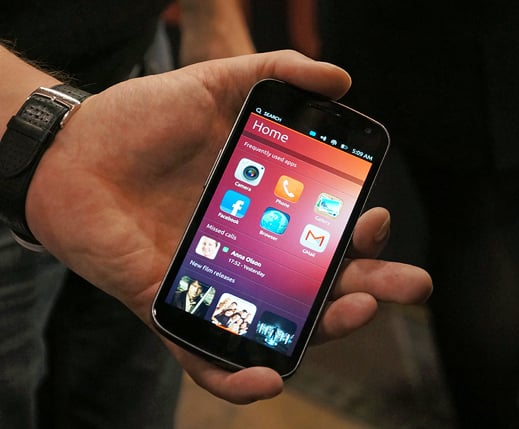Ubuntu Smartphone Aims for Success in Developing Economies
The man behind the world’s most popular Linux-based operating system, Ubuntu, has given new details about his plans to compete with Google by releasing a version of the software that runs on smartphones.

Speaking at a press preview session of the Consumer Electronics Show in Las Vegas, Mark Shuttleworth said that he expected to make the most progress with the Ubuntu Phone in the developing world, where smartphone sales are only just beginning to take off. The phone software was announced last week, but few details were given about how it would be released (see “Ubuntu to Offer Smartphone Operating Software”).
“I think carriers are looking to try us out in emerging markets,” said Shuttleworth, who noted that Ubuntu is already a household name in some of these markets due to its use on desktop and laptops PCs. “We ship on 30 percent of Chinese PCs today,” said Shuttleworth, including models from Dell, Lenovo, and HP. “If you go into a store in India, you will see Ubuntu branding,” he added. “It’s a very easy transition for us there.”
Ubuntu Phone, like the Ubuntu operating system for desktop computers, will be freely available open-source software. It will be built around the kernel Google created for its Android mobile software.
Canonical coördinates development of Ubuntu and makes money by offering paid-for support to companies using it, with many companies around the world using Ubuntu to run Internet and Web servers. Shuttleworth intends to replicate that model for Ubuntu’s mobile version.
Shuttleworth demonstrated the operating system running on a Galaxay Nexus phone, which is currently sold with Google’s Android operating system installed. Ubuntu’s software makes wide use of sideways swiping gestures, for example to summon the main menu of apps; swiping in from the edge of the screen can summon a ribbon of icons, which a person then slides their finger along to browse and select from.
Shuttleworth said he believes phone manufacturers will test the waters with Ubuntu by releasing a version of an existing Android phone with his OS installed, but under a different model name.
Ubuntu’s popularity in developing markets is hard to gauge. Even though a high proportion of PCs bought in India and China are bought with Ubuntu installed, many are soon wiped, with pirated copies of Microsoft Windows installed instead. Shuttleworth said the proportion of people choosing to keep Ubuntu installed is growing, and pointed out that in the smartphone world, no operating system has earned a position like that of Windows, which is considered almost mandatory by PC users worldwide.
Competition is also likely to become more intense in the markets Shuttleworth hopes to gain a foothold in. Yesterday Intel announced it would release a new smartphone chip aimed at developing world markets (see “Will the Developing World’s Phones Have Intel Inside?”). Meanwhile, low-cost Android phones from Chinese manufacturers are already gaining popularity in Africa (see “Android Marches on Africa”) and China. Although Google doesn’t yet gain much revenue from such models (see “Android Takes Off in China, but Google has Little to Show For It”), it hopes to extract profits from the accelerating growth in smartphone usage in such places.
Keep Reading
Most Popular
Large language models can do jaw-dropping things. But nobody knows exactly why.
And that's a problem. Figuring it out is one of the biggest scientific puzzles of our time and a crucial step towards controlling more powerful future models.
How scientists traced a mysterious covid case back to six toilets
When wastewater surveillance turns into a hunt for a single infected individual, the ethics get tricky.
The problem with plug-in hybrids? Their drivers.
Plug-in hybrids are often sold as a transition to EVs, but new data from Europe shows we’re still underestimating the emissions they produce.
Google DeepMind’s new generative model makes Super Mario–like games from scratch
Genie learns how to control games by watching hours and hours of video. It could help train next-gen robots too.
Stay connected
Get the latest updates from
MIT Technology Review
Discover special offers, top stories, upcoming events, and more.